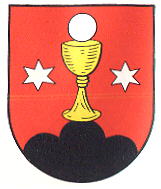Ottersweier: Difference between revisions
Knorrepoes (talk | contribs) m (Text replace - "|width="15%"|50 px|right |}" to "|width="15%"|50 px|right |}<seo title="Wappen, Gemeindewappen" />") |
Knorrepoes (talk | contribs) m (Text replace - "[[Literature" to "{{media}} [[Literature") |
||
| Line 24: | Line 24: | ||
Without the stars, the chalice was used as a village symbol on border stones. | Without the stars, the chalice was used as a village symbol on border stones. | ||
{{media}} | |||
[[Literature]] : Zier, 1964; John et al., 1990. | [[Literature]] : Zier, 1964; John et al., 1990. | ||
Revision as of 03:10, 9 July 2014
| Heraldry of the World Civic heraldry of Germany - Deutsche Wappen (Gemeindewappen/Kreiswappen) |
OTTERSWEIER
State : Baden-Württemberg
District (Kreis) : Rastatt (until 1972 Bühl)
Additions : 1936 Hatzenweier, 1973 Unzhurst (1936 Oberwasser, Zell)
Official blazon
In Rot auf schwarzem Dreiberg ein goldener Kelch mit silberner Hostie darüber, begleitet von zwei silbernen Sternen.
Origin/meaning
The oldest known seal of Ottersweier dates from the middle of the 18th century. It already shows the chalice with the stars and mountain. The wafer on top was originally also a star. The arms on the seals remained unchanged until 1876, when the chalice and stars were replaced by a candle in a beaker.
In 1895 the municipality wanted to define the colours of the arms, and the State Archives proposed the older arms in the present colours. Why the upper star was replaced by a wafer (a host) is not known.
The chalice is most likely the symbol of St. Barbara, the patron saint of a chapel on the local cemetery.
Without the stars, the chalice was used as a village symbol on border stones.
Contact and Support
Partners:
Your logo here ?
Contact us
© since 1995, Heraldry of the World, Ralf Hartemink 
Index of the site
Literature : Zier, 1964; John et al., 1990.











